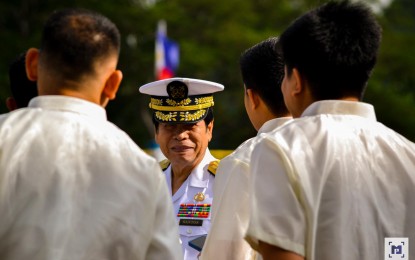
GROWING AGGRESSION. Maritime Academy of Asia and the Pacific president and former Philippine Navy chief Eduardo Santos on Tuesday (Dec. 12, 2023) urged the Philippine government to consider recalibrating its response to China's growing aggression in the West Philippine Sea. He said it is alarming that apart from the China Coast Guard, the People’s Liberation Army Navy is also getting involved in the harassment of Philippine vessels. (Photo courtesy of MAAP Facebook)
MANILA – The head of a maritime higher educational institution is urging the country’s political and military policy-makers to recalibrate their future responses to China’s growing aggressiveness in the West Philippine Sea (WPS) because the economic aspect is also involved.
In an interview on Tuesday, Vice Admiral Eduardo Santos (ret.), officer-in-command of the Philippine Navy from 1996 to 1999 and who is now the president of the Maritime Academy of Asia and the Pacific, said the involvement of the People’s Liberation Army Navy (Chinese Navy) in cutting off Philippine vessels headed for Ayungin Shoal over the weekend signals an escalation in Beijing’s expansionist efforts.
Santos said the Philippine government and its allies must protect freedom of navigation in the area surrounding the Spratlys because every year, an estimated USD5 trillion worth of cargo is carried by ship through the crucial ocean corridor.
“While Ayungin and other areas near the Spartlys are considered dangerous ground for navigation, because of the shallow waters there, a sea lane directly to the west is where valuable cargo passes going to and from different countries. No single country must be in the position to exert complete control over that sea lane. Imagine the economic impact if the ability to freely ship cargo is impeded,” he emphasized.
On Sunday, at least two Chinese Navy ships took part in risky maneuvers to block the passage of the civilian-led “Atin Ito” convoy, preventing volunteer sailors and activists from delivering fresh supplies and Christmas gifts to crew members of the marooned BRP Sierra Madre.
Santos explained that earlier efforts by China to discourage the movement of Philippine vessels in the area around the Spratly Islands only involved China Coast Guard (CCG) and maritime militia vessels which could at least maintain the pretense of being unarmed civilian ships.
“This (involvement of Chinese Navy) is really an escalation that our leaders must seriously take into consideration. They (Philippine government) should come up with an appropriate response for the growing use of force. I don’t want to be in their shoes… but we must not lose sight of the fact that our government has already submitted around 500 diplomatic protests (against China) with no apparent effect,” he told the Philippine News Agency.
It can be recalled that it was under Santos’ term as Navy chief in 1999 that the BRP Sierra Madre ran aground in a shallow part of the disputed waters.
The former navy chief surmised that Beijing’s recent aggressiveness is fueled by a realization that the Philippines’ military capabilities are quickly growing and that Manila and its allies might be planning on establishing a stronger naval presence in the WPS.
Let diplomacy reign
The International Chamber of Commerce (ICC) national committee, meanwhile, appealed to those calling for the expulsion of China’s ambassador to the Philippines to exercise restraint in view of the already degenerating maritime row.
In an interview on Tuesday, Jesus Varela, director general of ICC Philippines, said expelling the Chinese ambassador would sever the lines of communication between Manila and Beijing, and will surely cause bilateral relations to further sour.
“There are other diplomatic means to show displeasure. Let us not add fuel to the fire. We are calling for sobriety in these difficult times,” he told the Philippine News Agency.
The business leader noted that despite almost daily face-offs between Filipino and Chinese vessels in contested parts of the WPS, the dispute has yet to spread to the economic realm.
Varela reported that there has been no actual withholding of trade on either side.
“There are no adverse effects at the moment. No repercussions yet. I’m confident the (Philippine) government will take emotions out of decision-making. We must make calculated moves to avoid making things worse,” he added.
The ICC official pointed out that there are other diplomatic tools at the government’s disposal, such as recalling the Philippine ambassador to China to clearly communicate Manila’s grievance without completely burning bridges with the bellicose neighbor.
Varela said he is hopeful that China’s belligerent stance in the WPS is only part of “geo-political maneuvering” and would not deteriorate into an actual armed confrontation.
He pointed out that China remains to be an important trading partner of the Philippines.
The ICC, whose membership spans over 100 countries and whose mission is to help businesses trade internationally with greater ease, currently has an observer status at the United Nations.
The Chamber has three main activities: rule setting, dispute resolution and policy advocacy. (PNA)
